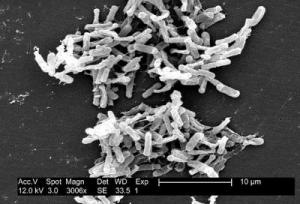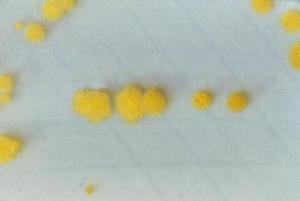On science blogs: Oh, pooh
OH, POOH. Much unhappiness at the Food and Drug Administration's decision to require an investigational new drug application from researchers and physicians who want to try fecal transplants for treating GI diseases. Maryn McKenna fills you in at Superbug. Doc Judy Stone is outraged. At SciAm's Molecules to Medicine, she called the FDA actions "the coup de grace for this treatment."
Recall that FMT (now the official acronym, standing for fecal microbiota transplant) has an astonishing list of accomplishments despite what Stone calls its "ick factor." At the PLoS blog Public Health Perspectives, Beth Skwarecki recounts that in one trial, fecal transplants resolved 94% of infections with the often-fatal bug Clostridium difficile, compared to the 27% of cases cured with the antibiotic vancomycin, the conventional treatment. For further astonishment, she says, consult the American College of Gastroenterology, which has declared that no adverse effects or complications from FMT have yet been described. Few therapies for any disorder can claim that track record.
Which is why a world authority on microbes is torn. At his blog The Tree of Life, the usually opinionated Jonathan Eisen is uncharacteristically ambivalent:
I guess the FDA feels like they have to do something given the spread of FT. Given how many scam artists and oversellers of the microbiome are out there I think some sort of increased protection or regulation is probably a good thing. But I am not sure what the best way to do this is … But given how little we know about FTs other than as treatment for Clostridium difficile infections it seems like one could make a reasonable argument for more regulation or caution. It seems strange though that we can do just about anything and everything we want to kill all the microbes around us with very little regulation and yet attempting to manipulate the microbes in and on us or add a few here and there is being regulated more.
Skwarecki concedes that, despite the success stories, we know very little about fecal transplants. Among the unanswered questions:
Does a donor have to be matched to the patient, or is any healthy stool good enough? Do some patients respond to the treatment and others don’t — maybe in a predictable way? Does the sample need to be fresh, and if not, what is the best way to store it? Can poop be replaced entirely by a synthetic, probiotic concoction? Are there legions of failed FMT patients who are too disappointed, or embarrassed, to publish negative results?
DIY FECAL TRANSPLANTS GIVE NEW MEANING TO THE TERM CITIZEN MICROBIOLOGY. One worry about the FDA restrictions is that they will drive FMT underground. But as usual the Internet provides alternatives — and in the case of fecal transplants has done so since at least 2011.
The Power of Poo is a noteworthy web site/blog, an extraordinary example of 'Net treasures. It's a thorough, sensible, rational source of information and instructions for people who suffer deeply from intractable gut problems and want to try a fecal transplant experiment on themselves. The information to be found there strikes me as extremely careful, even conservative.
Done right, DIY fecal transplants are elaborate procedures, and they require some help from the medical infrastructure. Thus they are not cheap. Testing a potential donor for disqualifying medical problems and his/her microbe population is essential. But it's the most expensive part of the process, costing $1,500 or more.
The transplant itself has several steps, but it's not particularly expensive, or technically difficult, or even time-consuming. Instructions are on the Power of Poo site. There are also lists of medical facilities and individual practitioners that can do fecal transplants and/or help with services like donor testing. Because of the FDA decision, U.S. facilities are now limited to the latter.
For a historical note, check out a post by the very eminent Stanley Falkow on Small Things Considered at the American Society for Microbiology. He participated in pioneering — and successful — fecal transplants in the 1950s. In fact, he got down and dirty with them. And got fired for his trouble.
SHIRT TALES: SCHRÖDINGER'S CAT IN SCIENCE JOURNALISM. I was going to write about the very odd recent conglomeration of dueling interpretations of 3 recent discoveries. They involve Alzheimer's disease, the origin of birds, and human cloning. In each case, media reports are in conflict about what the studies mean. But Paul Raeburn did a crackerjack job of puzzled explication over at the Knight Science Journalism Tracker, so I'll leave you with him.
SHIRT TALES: MORE PHYSICS, THIS TIME A THEORY OF EVERYTHING. The Guardian ran a sycophantic piece about a new, and entirely unevaluated, unified theory of physics. At SciAm's Cocktail Party Physics, Jennifer Ouellette calls it Eric Weinstein’s Amazing New Theory That Solves Every Puzzling Conundrum in Theoretical Physics Only He Hasn’t Written An Actual Paper Yet So Physicists Can’t Check All Those Hard Mathematical Details But Trust Us, It’s Gonna Be Awesome! Her target is not really the theory, it's the Guardian for running the piece. Take pleasure in her evisceration here.
SHIRT TALES: AND NOW FOR A LITTLE CHEMISTRY. There's a new song listing all the chemical elements in their correct order in the periodic table. Michelle Starr tells us all about it at CNET, where you can see the video whiz by and hear the song too. It's from ASAPScience in Australia, set to music from Jacques Offenbach, and the claim is it really will help you learn the periodic table — in 3 minutes. I haven't tried, so you'll have to see for yourself. Cute? Yes. Clever? Very. A lot of work? Looks like it.
My heart will always belong to the Tom Lehrer Periodic Table song from yesteryear, which employed Gilbert & Sullivan. Still, there can never be too many ways to learn the periodic table.





